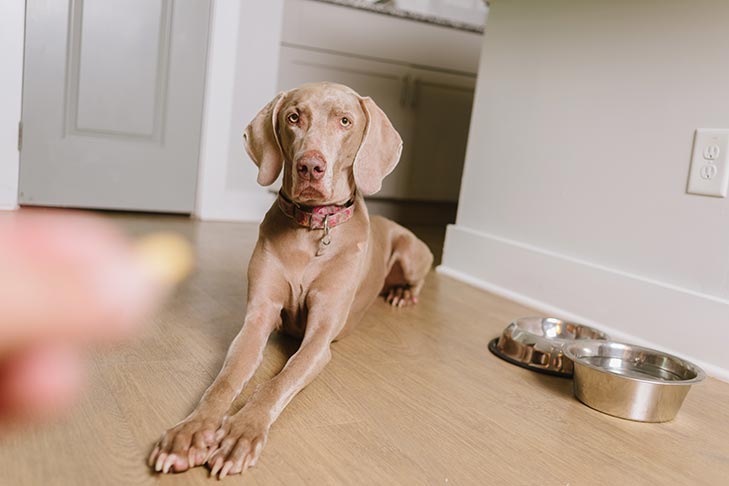Common Health Concerns in Senior Dogs

Common Health Concerns in Senior Dogs
There are many health concerns for senior dogs, but periodontal disease is one of the most common. This disease is completely preventable. If you don’t brush your dog’s teeth regularly, it’s quite likely that your dog has periodontal disease. If you don’t regularly brush your dog’s teeth, bad breath may be your only clue. Periodontal disease affects the gums and can result in inflammation, pain, and tissue loss.

Common Health Concerns in Senior Dogs
Obesity
Over 50% of dogs are overweight, and obesity can lead to serious problems for your dog, such as diabetes and joint disease. Regular visits to your veterinarian can help you develop a diet plan that will allow your dog to regain a healthy weight. Just like humans, senior dogs are susceptible to certain types of cancer. During these exams, your veterinarian can detect any changes that may signal cancer and help your dog stay healthy.
A number of causes contribute to dog obesity, including excessive snacking and a lack of exercise. High-calorie foods, frequent table scraps, and excessive treats can also contribute to obesity. Obesity in dogs is diagnosed using body weight and a body condition score, which measures how much fat a dog has on its body. Your veterinarian will feel your dog’s ribcage and tail, and compare the results to a BCS chart to determine the animal’s weight. If your dog looks like a fatty fish, he or she may be obese.
Arthritis
Many owners attribute the slowing down of their senior dogs to aging. But arthritis in senior dogs can help your dog feel like a puppy again. Understanding arthritis and what it is, will help you recognize it in your pet. Consult your veterinarian for an accurate diagnosis. Here are a few common signs to look for. These include slowing down, lethargy, and reduced activity levels. Read on to learn more about arthritis in senior dogs.
The first line of treatment for arthritis in senior dogs is usually anti-inflammatory drugs and pain-killers. While these medications are effective in the early stages of arthritis, it is better to address the disease in a multi-modal approach to help alleviate pain. A multi-modal approach allows veterinarians to use lower doses of pain medication. As the disease progresses, additional layers of pain management may be added, including gabapentin, amantadine, or tramadol.
Cognitive Decline
Cognitive Decline in senior dogs is a complex set of behavioral changes that can lead to the dog losing their faculties and functioning less effectively. Although the exact causes are unknown, many changes in the human brain can affect the behavior of our pets. The first step in diagnosing cognitive decline in your dog is to take a health history. Your veterinarian will evaluate your dog’s overall health as well as cognitive function, and will also perform routine blood tests, ultrasounds, and X-rays to rule out any disease.
Exercise is another great way to combat cognitive decline in senior dogs. A daily walk or game with your dog will provide mental stimulation. Puzzles and games are also excellent ways to keep your dog mentally active. Enrichment activities can include rotating puzzle toys, playing games such as hide and seek, and learning new training techniques. Supplementation with key nutrients may help slow cognitive decline and slow down the progression of neuronal damage. Your vet may prescribe certain medications that can help manage the symptoms of cognitive decline in senior dogs.
Hearing and Vision Loss
The first thing to remember is that hearing and sight loss are common in older dogs. These conditions may be difficult to detect unless your dog is displaying signs. These signs include getting frightened easily and having trouble recalling. As your dog ages, his body adapts to the changes. Fortunately, you can still maintain a high quality of life for your pet even though they may experience vision and hearing loss.
Senior dogs with vision and hearing loss are more prone to getting frequent infections. These problems can also cause your pet to ignore you or have trouble understanding your commands. If your dog is experiencing vision problems, try to remain as positive as possible and communicate to him in ways he understands. Often, these problems aren’t immediately apparent, but early detection is crucial. While these concerns may be unpleasant, a veterinarian will be able to prescribe the proper medication or suggest surgery if needed.
The first sign that your dog has vision and hearing loss is if he begins to ignore your cues. You might notice your pet ignoring your voice, becoming unresponsive to name calls, or even avoiding your presence. If you notice your dog losing hearing, make an appointment with your veterinarian. He can perform a hearing test or perform some other test that will reveal the issue and treat it properly.
Vision Loss
Older dogs are prone to eye problems that are common to canines. In some cases, foreign objects lodged in the eye can scratch the cornea and irritate the conjunctiva. You may notice your dog blinking constantly, squinting, or holding his eye shut. Fortunately, cataracts are treatable with surgical procedures. Your vet will perform several tests to diagnose the condition. These include a visual examination and a blood test.
Although not all older dogs develop vision problems, symptoms of deterioration include difficulty finding objects, inability to catch thrown objects, and inability to catch items. A red eye or crustiness on the eyelids is a sign of an underlying health problem. Your veterinarian will likely suggest that you take your dog to a vision specialist. These symptoms can be subtle or noticeable, but they are common in older dogs.
Besides vision loss, other medical problems in your pet can cause vision loss. Several conditions can cause blindness, including diabetes, liver disease, anemia, and auto-immune diseases. In addition, eye infections can affect the nerves and retina. If you suspect your dog may be suffering from a vision problem, it’s best to seek veterinary care immediately. It’s important to note that vision problems often don’t resolve themselves, so it’s important to get your dog checked regularly.
Hearing Loss
Senior dogs are often prone to hearing loss. This common problem may be subtle or progressive. Your dog may appear confused or ignore your cues, or may even become non-responsive to name calls and familiar sounds. You should take your dog to the veterinarian to rule out any underlying medical conditions and to assess the severity of the problem. If you suspect that your dog is experiencing hearing loss, you should be prepared to make adjustments to their environment.
A trained dog can learn to adapt to a permanent hearing loss. He or she may need to be trained to recognize and respond to visual commands rather than auditory ones. To teach a deaf dog to respond to commands, use visual cues. Consistency is key. If you suspect your dog may be deaf, stomp the ground to attract attention. A veterinarian will examine the dog’s ears with an instrument called an otoscope.
Urinary Incontinence and Kidney Disease
While a senior dog is not as likely to experience urinary incontinence as a younger dog, it can be a sign of other underlying problems. Kidney disease and spinal problems can both cause urinary incontinence. Disc bulge or rupture may cause the inability to control the bladder. Diabetes or kidney disease can also lead to urinary incontinence in an older dog.
A combination of underlying problems can cause a senior dog to develop urinary incontinence. The most common is bladder stones. Both males and females may experience incontinence due to prostate disease. The condition also leads to increased licking of the penis and vulva. Senior dogs with urinary incontinence may also have malodor. As a result, owners often seek treatment as soon as they notice wetness or malodor in the area where the dog sleeps.
To determine the underlying cause of the condition, a veterinarian will perform a full examination and take a urine sample. If a urinary tract infection is found, antibiotics will be prescribed. Depending on the cause of the incontinence, other tests may be needed as well. A veterinarian will perform a full physical examination, urinalysis, and blood work to determine whether the dog is suffering from a urinary tract infection.
Cancer
Although cancer is a common ailment among senior dogs, the exact cause is not always known. A new study suggests that prostate cancer is more common in male dogs than female dogs. This study may have implications for our understanding of prostate cancer in human beings. Despite the similarities between the human and canine cancers, the study’s limitations must be considered. Listed below are the main differences between cancers in dogs and in people.
Several breeds of dogs with elevated rates of the same cancer may share a genetic predisposition. It’s possible that they shared a common founder during the development of these breeds. We can test this by collecting DNA from cheek swabs of dogs with cancer and those of age-unaffected controls. The data can then be compared to the genomes of these two populations. It’s a simple and cost-effective approach, and the results may surprise us!
Early detection of cancer is essential for effective treatment. Most cancers in dogs can be removed just like a tumor. Moreover, if caught early enough, it’s much more likely to remain in one area and not spread. Treatment options vary according to the type of cancer and its stage. If detected in its early stages, treatment success is possible and the quality of life will be significantly improved. There are many ways to detect the cancer in dogs, so early detection is critical.














